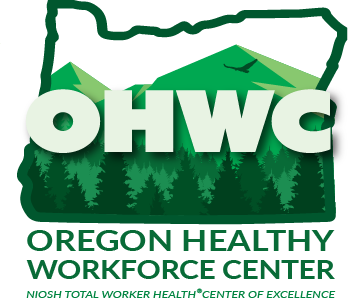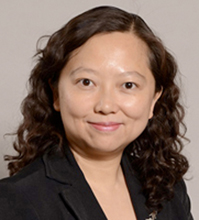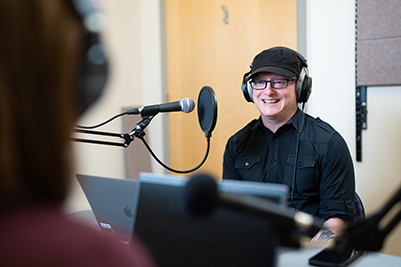Founded in 2011, the Oregon Healthy Workforce Center (OHWC) is one of ten National Institute for Occupational Safety and Health (NIOSH) Total Worker Health® Centers of Excellence. We are the only Total Worker Health® Center of Excellence serving NIOSH Region 10, which includes Oregon, Washington, Idaho, and Alaska. With support from NIOSH, we conduct research, outreach, and education to improve worker safety, health, and well-being using the Total Worker Health approach.
OHWC is housed within the Oregon Institute of Occupational Health Sciences, which includes nationally recognized faculty and staff who bring expertise in psychology, occupational health and safety, public health, ergonomics, sleep and circadian health, and biological sciences. Together, we leverage this multi-disciplinary knowledge to improve safety, health, and well-being in the workplace.
OHWC is Oregon’s only research center dedicated to studying, developing, and implementing TWH programming and practices.

Mission and theme
OHWC’s mission is to improve worker well-being by helping organizations prioritize physical and psychosocial safety at the workplace, design safe and healthy work, and facilitate a positive organizational culture.
Our theme is Total Worker Health intervention effectiveness, translation, and outreach to advance safe and healthy work design.

Research
At the OHWC, our research focuses on understanding and addressing the challenges facing the 21st century workforce. From sleep and cardiovascular health to workplace climates and cultures, we work at the intersection of work, physical, and mental health.

Education, outreach, and partnerships
OHWC is actively engaged in making our work accessible to practitioners and organizations who could benefit from implementing TWH-informed and evidence-based practices. To achieve this end, OHWC actively participates in community outreach, education, and dissemination activities, and implementation of TWH programming.

Supportive Workplaces Training Programs
The Supportive Workplaces website is home to the Institute’s publicly accessible suite of evidence-based, online training programs that support safety, health, and well-being through interventions designed to increase employee-supportive behaviors. Our programs offer a computer-based training module followed by behavioral reinforcement tools and templates.
Total Worker Health®
Total Worker Health® (TWH) as defined by NIOSH, includes policies, programs, and practices that integrate protection from work-related safety and health hazards with the promotion of injury and illness prevention efforts to advance worker well-being. The Total Worker Health® (TWH) approach seeks to improve the well-being of the U.S. workforce by protecting their safety and enhancing their health and productivity. Using TWH strategies benefits workers, employers, and the community.
OHWC is Oregon’s only research center dedicated to studying, developing, and implementing TWH programming and practices. As a NIOSH TWH Center of Excellence, OHWC increases regional capacity for learning and applying TWH approaches.
OHWC contributes to workplace practices and worker well-being through TWH-focused research and development of educational and evidence-based resources, education for practitioners and organizational leaders, and stakeholder partnerships and collaborations aimed at the adoption and implementation of best practices for worker safety, health, and well-being.

Oregon Healthy Workforce Center annual reports
Our latest annual report highlights the many ways in which research and outreach at the Center contribute to the health, safety, and well-being of the workforce in Oregon and beyond.
- Oregon Healthy Workforce Center FY 2025 Annual Report
- Oregon Healthy Workforce Center FY 2024 Annual Report
- Oregon Healthy Workforce Center FY 2023 Annual Report
- Oregon Healthy Workforce Center FY 2022 Annual Report
- Oregon Healthy Workforce Center FY 2021 Annual Report
Our Oregon Healthy Workforce Center impact report tracks major developments and achievements over the years.
- Oregon Healthy Workforce Center Impact Report: Oregon Healthy Workforce Center Impact Report.pptx
Contact us

Leslie Hammer, Ph.D.
Director
hammerl@ohsu.edu

Emily (Yueng-hsiang) Huang, Ph.D.
Associate Director
huangyu@ohsu.edu

Anjali Rameshbabu, Ph.D.
Center Manager and Outreach Core Lead
rameshba@ohsu.edu
Learn more about our work

Newsletter
Explore professional development opportunities, the latest updates from the Oregon Healthy Workforce Center and the Occupational Public Health Program, a research snapshot, and upcoming occupational health-focused events.

Blog
The Oregon and the Workplace Blog features the latest from OccHealthSci research, professional development opportunities, and valuable insights from disciplines associated with occupational health, safety, and well-being.

Podcast
The What's Work Got to Do with It podcast, produced by OccHealthSci, brings together occupational health, safety, and well-being experts to discuss the latest topics relating to worker health, well-being, and safety in Oregon and beyond.
